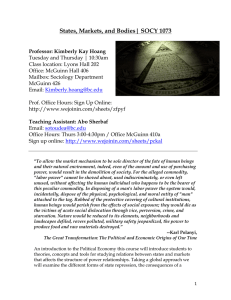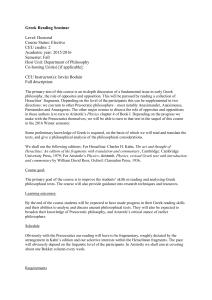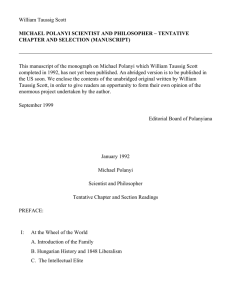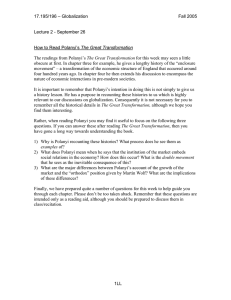PHI 2205 Philosophy of Economics
advertisement
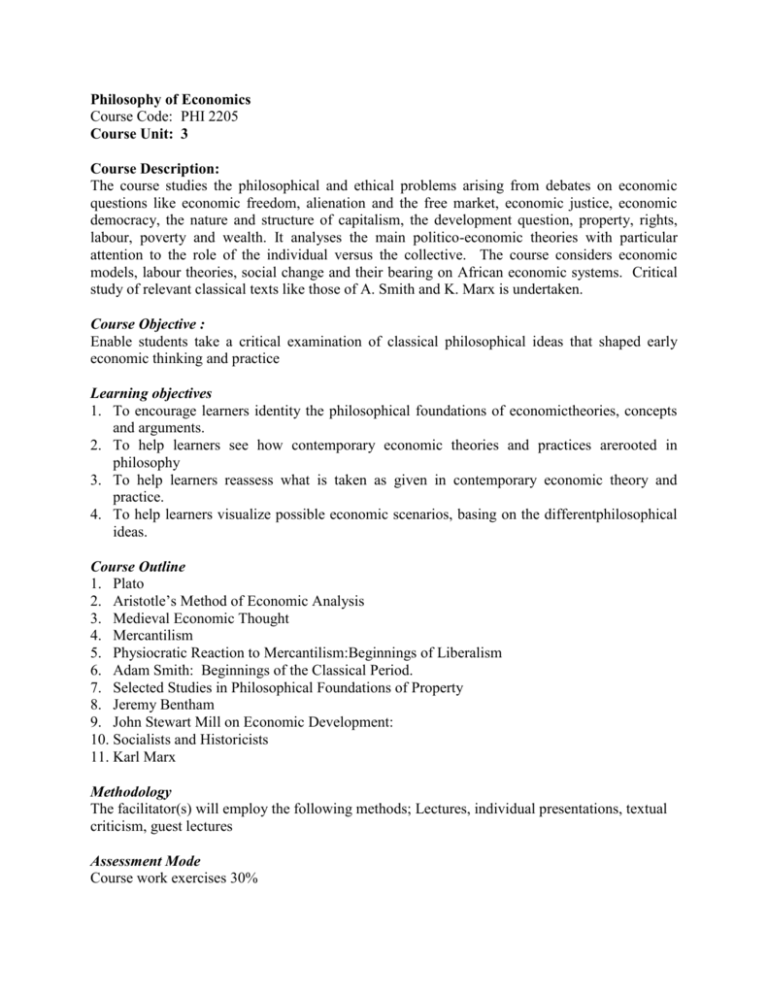
Philosophy of Economics Course Code: PHI 2205 Course Unit: 3 Course Description: The course studies the philosophical and ethical problems arising from debates on economic questions like economic freedom, alienation and the free market, economic justice, economic democracy, the nature and structure of capitalism, the development question, property, rights, labour, poverty and wealth. It analyses the main politico-economic theories with particular attention to the role of the individual versus the collective. The course considers economic models, labour theories, social change and their bearing on African economic systems. Critical study of relevant classical texts like those of A. Smith and K. Marx is undertaken. Course Objective : Enable students take a critical examination of classical philosophical ideas that shaped early economic thinking and practice Learning objectives 1. To encourage learners identity the philosophical foundations of economictheories, concepts and arguments. 2. To help learners see how contemporary economic theories and practices arerooted in philosophy 3. To help learners reassess what is taken as given in contemporary economic theory and practice. 4. To help learners visualize possible economic scenarios, basing on the differentphilosophical ideas. Course Outline 1. Plato 2. Aristotle’s Method of Economic Analysis 3. Medieval Economic Thought 4. Mercantilism 5. Physiocratic Reaction to Mercantilism:Beginnings of Liberalism 6. Adam Smith: Beginnings of the Classical Period. 7. Selected Studies in Philosophical Foundations of Property 8. Jeremy Bentham 9. John Stewart Mill on Economic Development: 10. Socialists and Historicists 11. Karl Marx Methodology The facilitator(s) will employ the following methods; Lectures, individual presentations, textual criticism, guest lectures Assessment Mode Course work exercises 30% End of semester examination 70% Reading List 1. Robert B. Ekelund, Jr. Robert F. Herbert, A History of Economic Theory and Method, 2nd Edition, McGraw-Hill Book Company 1983. 2. M.L.W Laistener, Greek Economics, London, Dent, 1923 3. Dempsay, Bernard W. "Just Price in a Functional Economy," In American Economic Review, Vol. 25, Sept. 1935 pp. 471-486 4. Laugholm, Odd, Price and value in the Aristotelian Tradition, Bergen, Norway: Universittetsforlaget , 1979. 5. Monroe, A.E Early Economic Thought, Cambridge , Mass : HarvardUniversity Press, 1924. 6. Polanyi Karl , "Aristotle Discovers the Economy", In George Dalton (ed) Primitive Archaik and Modern Economies: Essays of Karl Polanyi, Boston : Beacon Press, 1968. 7. Schumpter, T.A . History of Economic Analysis E.B. Schumpter (ed) New York : Oxford University Press, 1954. 8. Ernest Barker, The Politics of Aristotle, OxfordUniversity Press, 1971, Books. 9. Dempsey, Bernard W. "Just Price in a Functional Economy", American Economic Review, Vol. 25, 1935, pp. 4871-486. 10. Gray, Alexander, The Development of Economic Doctrine 2nded, London, Longman, 1980 11. Laugholm, Odd, Price and Value in the Aristotelian Tradition, Bergen, Norway : Universitetsforlaget 12. Mouroe' A.E. Early Economic Thought, Cambridge Mass: HarwardUniversity Press, 1924 13. Polanyi, Karl, "Aristotle Discovers the Economy" in George Dalton (ed) Primitive Archaic and Modern Economies: Essays of Karl Polanyi, Boston, Beacon Press, 1968 14. Schumpter, J.A. History of Economic Analysis, EB, Schumpter (ed) New York, Oxford University Press 15. Robert, B. Ekelund Jr. & Robert F. Herbert, History of Economic Theory andMethod, 2nd Edition, McGraw-Hill Book Company,1983 16. Joseph J. Spengler, "Mercantilist and Physiocratic Growth Theory" In Bert F. HoselitzTheories of Economic Growth, The Free Press of Glencoe, Illinois. 1960, pp.3-64




